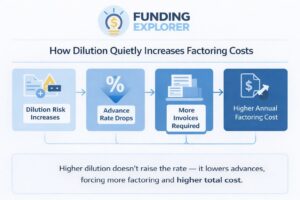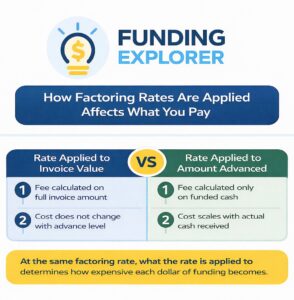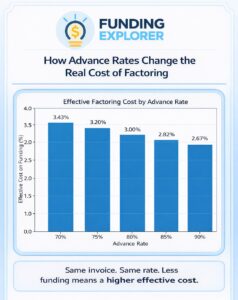When hurricanes, floods, wildfires, or severe storms hit, you and your crews mobilize fast, restoring power, removing debris, pumping water, rebuilding infrastructure, and bringing communities back to life.
But behind that critical mission lies a familiar problem: cash flow.
Municipalities, general contractors, and government agencies—the very clients who hire you—can take 60, 90, or even 120 days to process invoices. In the meantime, your payroll, fuel, lodging, and equipment rentals can’t wait.
Invoice factoring gives disaster recovery contractors the working capital they need to stay mobilized and ready, without waiting for red tape or slow reimbursements.
A Customer Story & Testimonial
Coastal Response Group, a Gulf Coast-based disaster recovery company, provides debris removal and infrastructure restoration after hurricanes and floods.
After completing several municipal projects following a Category 4 storm, they found themselves waiting nearly 90 days for payment, with over $1 million in receivables tied up in processing.
Partnering with a Funding Explorer factoring provider allowed them to advance 90% of their invoices within 48 hours, keeping cash available for fuel, housing, and payroll during one of their busiest seasons.
“Factoring lets us stay operational between storms instead of waiting on paperwork.” — Chief Operations Officer, Coastal Response Group

What Is Invoice Factoring for Disaster Recovery Companies?
Invoice factoring is a cash-flow solution commonly used by service providers that respond to emergencies, including those involved in debris removal, restoration, power restoration, and temporary infrastructure.
Instead of waiting months for payments from large organizations or FEMA-linked agencies, you can sell your unpaid invoices to a factoring company that understands disaster recovery contracts.
Here’s an example of how it works in practice:
If your company completes a $250,000 debris-removal project, for example, after being hired by a government agency, a factoring partner can advance up to 90–95% of that invoice in 24–48 hours. When your client pays, you receive the remaining balance minus a small fee, typically 1–3%.
Factoring keeps you liquid, so you can pay crews, rent heavy equipment, purchase materials, and even move to the next recovery zone while payments are still in process.
The Financial Strain Behind Every Recovery Effort
Disaster recovery contractors face a unique set of financial challenges.
When catastrophe strikes, the work starts immediately, but the money trickles in slowly.
You’re dealing with:
- Massive upfront costs for fuel, generators, and debris-hauling equipment
- Payroll for crews working overtime in crisis zones
- Lodging, meals, and transportation for deployed workers
- Invoices to government agencies and general contractors can take months to approve
Even established recovery relief companies often wait for large receivables from entities such as FEMA and state emergency management agencies.
For smaller regional contractors, such as storm recovery services, debris management, or rapid response cleanup, those payment delays can mean missing payroll or turning down contracts they could otherwise fulfill.
- Many contractors report waiting 60–120 days for payment from municipalities and federal agencies.
- Fuel and labor make up more than 45% of total operating costs for recovery firms, making steady cash flow essential during large deployments
Turning Invoices Into Immediate Relief
Think of factoring as a financial first responder for your business.
Once your invoices are verified, the factor advances you most of your outstanding receivables balance, usually within one or two business days.
That means you can fund cleanup crews, rent excavators or haulers, and pay local vendors while waiting for FEMA or the city to process payment.
When the invoice is finally paid, you receive the remainder (minus a small service fee).
There are no credit checks on your business, no long applications, and no added debt, just access to the cash flow you’ve already earned.
Factoring ensures that your ability to respond to disaster isn’t limited by slow bureaucratic payment cycles.
Why Disaster & Restoration Contractors Choose Funding Explorer
Funding Explorer helps recovery and restoration contractors find factoring programs built for emergency service providers.
Why it works:
- Fast approvals and 24-hour funding
- Advances up to 95% of the invoice value
- Expertise with FEMA and municipal-backed receivables
- No setup fees or long-term contracts
- Credit evaluation based on your clients, not your business
It’s a free, fast, and expert matching service, built to help disaster response companies maintain momentum when the work (and the need) can’t wait.
Questions About Factoring Commonly Asked By Disaster Relief Contractors
Can disaster recovery firms with FEMA contracts qualify?
Yes. Most factors that serve this sector are familiar with FEMA-related billing, progress payments, and reimbursement cycles. As long as invoices are approved, they can be factored.
Who are typical clients (debtors) for this type of factoring?
Common payers include FEMA, state and local governments, county emergency departments, and general contractors overseeing restoration work.
How quickly can funding be secured after an event?
Once your factoring application is approved, you can start factoring invoices within 24–48 hours, even while your crews are still deployed in the field.
Does factoring help with subcontractor or equipment rental payments?
Yes. Many disaster response companies utilize factoring to pay subcontractors, fuel vendors, and equipment rental companies upfront, while waiting for government payouts.
Can I factor invoices from multiple disaster zones or contracts?
Yes. Factoring works across multiple projects, from hurricane cleanup in Florida to wildfire debris removal in California, as long as the clients are creditworthy.
Keep Your Recovery Crews Funded and Ready
In disaster recovery, every minute counts, but payments rarely move that fast.
Factoring gives you the steady cash flow to respond immediately, pay your crews, and stay ready for the next call.
Analia Miguel is an MBA and former CPA with 20+ years in business finance and marketing, including 14 years in alternative business finance. She helps business owners understand their funding options and choose cash flow solutions that truly fit their needs.
Last Updated: November 10th, 2025
Business Funding Expert Insights
Talk to a Funding Expert — Free, Fast, and Focused on Your Needs
Our advisors specialize in helping disaster recovery companies manage cash flow after major storms and emergencies. Get matched with a factoring partner who understands your work.




